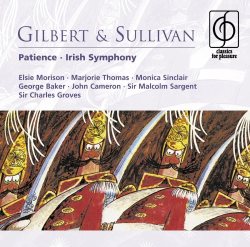|

|
W.S. GILBERT (1836-1911) and Arthur SULLIVAN (1842-1900)
Patience (1881) [77:14]
John Shaw (baritone) - Colonel Calverley
Trevor Anthony (bass) - Major Murgatroyd
Alexander Young (tenor) - Lieutenant the Duke of Dunstable
George Baker (baritone) - Reginald Bunthorne
John Cameron (baritone) - Archibald Grosvenor
Marjorie Thomas (contralto) - The Lady Angela
Monica Sinclair (contralto) - The Lady Jane
Elizabeth Harwood (soprano) - The Lady Saphir
Heather Harper (soprano) - The Lady Ella
Elsie Morison (soprano) - Patience
Glyndebourne Festival Chorus
Pro Arte Orchestra/Sir Malcolm Sargent
rec. No. 1 Studio, Abbey Road, London, October 1961
Arthur SULLIVAN
Symphony in E (Irish) (1866) [35:46]
Royal Liverpool Philharmonic Orchestra/Sir Charles Groves
rec. Philharmonic Hall, Liverpool, June 1968
CLASSICS FOR PLEASURE 2134492 [52:31 + 60:29]
Patience has always struck me as one of the weaker entries in the Savoy canon. Gilbert's satirical targets here - the pre-Raphaelite movement, as embodied in the Rapturous Maidens, and poet Reginald Swinburne, here reconstituted as Reginald Bunthorne - don't really merit the sustained attention: the libretto stretches a one-note joke to an evening's length. The music is pleasant, but, save in the imitation-Verdi first finale and the "military" numbers for the Dragoon Guards, not particularly dynamic. I realize the piece has its diehard devotees, who would have it no other way.
So it's perhaps ironic that I should find this one of the best performances in the Sargent/Glyndebourne G&S series. First of all, the EMI engineers seem finally, by 1961, to have figured out where to put the microphones. The orchestral image is clear and colourful - none of the patches of diffuse imaging heard elsewhere - with full strings and "present" woodwinds. The chorus registers with body and warmth, particularly in the first finale's not-quite-a-cappella sextet episode.
The piece also brings the best out of Sir Malcolm Sargent. A lot of this score is in 6/8 time - the Colonel's entrance song, both of Patience's arias, and the second-act quintet, for starters - and Sargent, sometimes accused of stodginess, infuses the rhythms, here and elsewhere, with a nice lift. The faster numbers are sprightly; the Dragoons' choruses are crisp and bright-eyed. The women's numbers call for more languor; Sargent shapes them expressively, but keeps the line firm, so they don't droop. The orchestral playing is vivid. In the Overture, the trumpet tunes stop just short of cornettish mawkishness, and the fast section dances, gracefully. The woodwind duets introducing the first finale have a properly antique feel.
The duelling poets around whom the show revolves can be a trial; here they come off well. George Baker, although primarily an actor - and never, incidentally, a stage exponent of these patter roles - is a more fully "sung" Bunthorne than one often hears, and inflects the text with point. John Cameron's Grosvenor sounds gummy and stilted at first, but his "Magnet and the Churn" song is appealing.
Colonel Calverley is peculiarly written: he's required to hold down the bottom line in ensemble, yet his two wordy solos repeatedly bang at the middle D. John Shaw gets off to a fine, clear start, but becomes more blustery and less comprehensible as each verse continues. In his second song - just as high, but less pattery, and less of a rhythmic treadmill - he's forthright and full-toned. Since the booklet calls him a baritone and bills Trevor Anthony (Major Murgatroyd) as a bass, it's possible that they've switched lines in the ensembles. Alexander Young, whom I've favourably compared to Richard Lewis elsewhere in this series, gets into the spirit of things, but his Duke sounds a bit mannered and puckered — almost like Richard Lewis, actually.
Elsie Morison was always an odd fit for the G&S heroines: she's a strong Josephine (Pinafore) and a pleasing Phyllis (Iolanthe), but her Giannetta (Gondoliers) and Mabel (Pirates) are strained. Her Patience falls between those extremes. She begins charmingly; but the second verse of her entrance song, with every syllable met-i-cu-lous-ly pronounced, sounds like elocution lessons, and she's a bit arch in the two duets. Her top, as usual, is dicey. She doesn't try for the high D in the entrance song, and manages - just - to squeeze out the C sharp in the first finale; at least, I assume it's she doing the squeezing. In the Act II song, the high As, attacked cold, are fluttery.
Monica Sinclair doesn't flinch from Lady Jane's plummy depths. The Act II song - the one usually staged with cello - is another one-note joke, but she sings it with character, and she and Baker render the duet So go to him with music-hall zest. The various other ladies sing well, if rather "devotionally".
Since there's not really a whole lot of music in Act II, there's room on the second disc for a substantial makeweight in the Irish Symphony. Groves' recording, the first generally available, holds its own handily against more recent competitors. Savoyards and non-, alike, may be surprised at the lively, dramatic opening movement. The Andante espressivo, which takes a page or two to get going, recalls Mendelssohn in his stately mode; the Allegretto's oboe solo reminded me of Max Bruch's Scottish Fantasy - not Irish, perhaps, but comparably Celtic. The finale balances lyrical and tensile elements most effectively. The sound is colourful, though digital processing has rendered it drier than on my copy of the LP (ASD 2435), making the orchestra sound a bit smaller as well.
In the operetta, the opening number begins attacca after the Overture: an artistic decision, or an editing slip? I'd also have liked more of a pause between the symphony's first two movements.
Stephen Francis Vasta
Stephen Francis Vasta is a New York-based conductor, coach, and journalist.
 |
 |
|



 All Nimbus reviews
All Nimbus reviews








